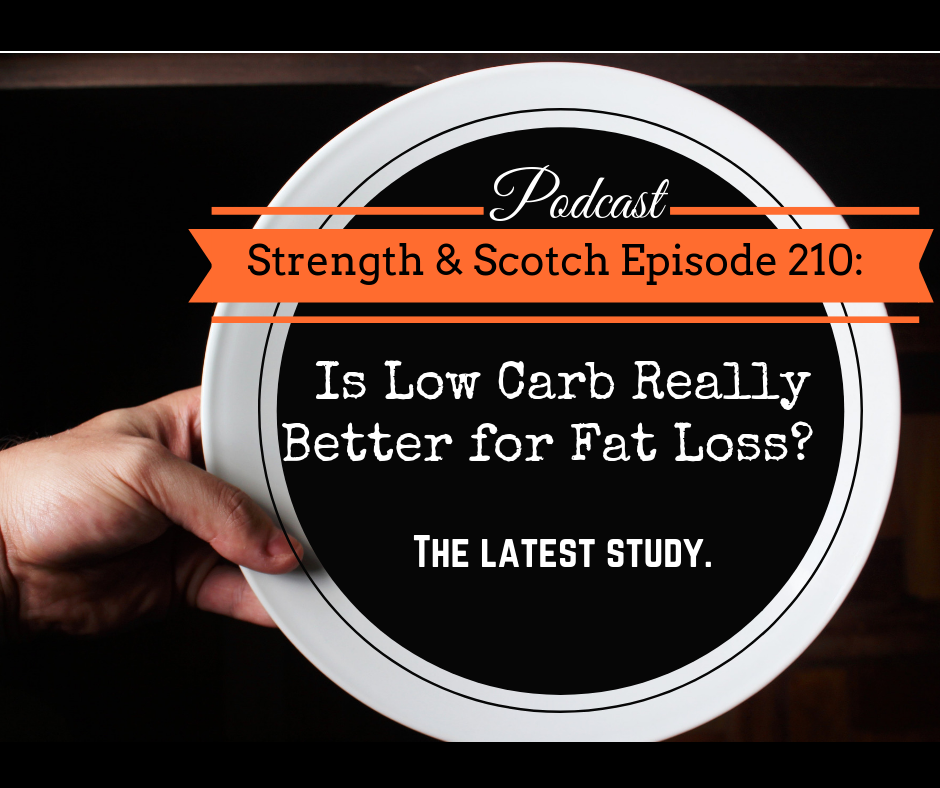SS 210 – Is Low Carb Really Better for Fat Loss? The latest study.
Episode 210 Show Notes
Grant and Heavey discuss an article Grant found regarding a study suggesting a low carb diet is the best diet to lose weight. But is it really? Listen in to find out more about their take on statistical data as opposed to just going through the weight loss process based on the nuances of each individual.
[03:23] Not All Calories Are Equal
Grant pulls up an article about a study that recently looked at calories in vs calories out. It says it isn’t all calories in vs. calories out. Not all calories are equal. Keeping carbs low to reduce the release of insulin will stop you from gaining weight.
Initially, Heavey brushed off this study, further explaining that there’s a whole body of evidence on this topic already. So when one new study comes out, it doesn’t automatically throw out everything else we learned on the topic.
[05:26] So What Was the Study All About?
The study got obese individuals to lose weight. All of them lost weight on the exact same diet. They had them lose 12% of their body weight over 10 weeks on a lead-in period for this diet. They’re all identical diets. If they didn’t lose weight, they’d kick them out of the study. But they were able to very tightly control the study. It’s hard to conduct nutritional studies over a long period of time because you’re just counting on people to recall the foods they eat. You’re trusting that they do that well but we know through a lot of research that they don’t. In this study, they provided all the meals for everybody.
After they got a lot of people to lose 12% of their body weight, they split them into three groups. One was a low carb group that had 20% of their calories from carbs. Another was a moderate carb group that had 40% of their calories from carbs. And the last one was a high carb group that had 60% of their calories from carbs.
They measured a bunch of metabolic parameters on these individuals over a period of 20 weeks while setting their intake and continually adjusted it so they would maintain that 12% loss over that period, so they weren’t losing additional weight on these new diets. They were maintaining their original weight loss.
They measured a higher daily energy expenditure for the groups that had the lowest carb intake. The 20% carb diet group had an elevated daily energy expenditure. They found an inverse relationship with carbs. The theory they’ve put out is that there is some magic metabolic effect that happens on this diet. However, there’s no explanation for it.
[08:10] Protein Control
Another key positive constraint in the study was the control for protein, which studies don’t always do. For instance, protein has a higher thermic effect so it takes more calories to burn the protein you consume than it does to burn fat or carbs. There may have been some impact from the thermic effect showing up in these results.
So what they found was a 200-calorie difference. That’s not a small amount. It has a profound implication on the sustainability of a diet because sticking and maintaining weight loss is the key issue with people’s journey on losing fat.
[11:12] Is There a Statistical Anomaly?
The study was conducted very rigorously. That being said, Heavey points out that none of these studies may be conducted as rigorously as this one. If we were to do a meta-analysis of everything, the result would be that there’s no difference in resting energy. However, some of them showed higher energy expenditure on a higher carb diet and some showed lower. This is all a statistical problem and it’s possible to register a number that’s higher as a statistical anomaly.
Again, you can’t just throw out 20 studies because one new study was conducted really well. That’s challenging to do since you’re basing all your weight on how well the study was conducted.
[14:20] Measuring Through the Doubly Labeled Water
They measured energy expenditure through doubly labeled water, which is something they can measure in your urine that helps them determine your energy expenditure. It’s the golden standard for measuring energy expenditure when you have people living in the open as opposed to the way they conduct more short-term studies where they can very precisely measure your energy expenditure.
The problem is that the doubly labeled water technique is known to be effective when used for people that have a stable diet. In an environment where a diet is changing, it is known to be less reliable.
When they originally pre-registered the study, they were going to use the baseline numbers for people prior to them going onto their new diets. They changed that and ended up measuring the doubly labeled water as people were transitioning diets; instead of having a fixed regular diet leading up to using that technique.
The point is that this technique is not known and hasn’t been well-established. It’s isn’t the gold standard for when people are on a changing diet. Now, the researcher went back and recalculated the numbers and he found that the caloric difference in energy expenditure dropped by more than 50%.
[17:40] Calories In vs Calories Out
The problem Heavey has with this is that people talk about it a certain way that he’s not okay with. Essentially, energy conservation has to happen. It’s the law of the universe. However, the body is not a closed system so we’re affected in different ways by the nutrients that we consume. This this factors into “calories in – calories out.”
[19:17] Has Heavey Changed His Beliefs?
Heavey explains that one study would be very difficult to change his beliefs on a topic that already has so much literature to back it up. He does find the results interesting and he’d like to see this taken further. He’s not one to discount it but he wants to get to the bottom of it and understand what’s happening.
[24:30] Understand It, Don’t Resist It
Heavey explains that it’s important we take advantage of all the rigorous approaches to science and come up with new findings. If they’re in conflict with the things we learned in the past then we have to build on that and understand why that’s so. We need to continue to pull that string. We can’t fully trust one study and be done.
Moreover, if you feel good on a low carb diet and you succeed on it then that’s fantastic. Just based on personal experience, he has seen all sorts of diets work for people to lose fat and keep it off. A lot of times, people tend to focus on these things that provide the 5% when they’re not doing the things that provide the 50%.
These people may be crushing themselves in the gym but not paying attention to their nutrition or not sleeping enough. Once you’ve got your bases covered with the health pillars and want to see an extra 5%, and you think that’s going to be helpful for you, then these sort of topics can be considered.
[27:50] Be Skeptical with Diet Tribes
Everybody loves to be in a diet camp and the concept of diet cliques can lead people to pursue paths that aren’t helpful for them long-term. Instead, find something that’s helpful for somebody long-term, whether that’s low carb or not. Just find what’s working for you.
Ultimately, Grant raises a valid point that we just have to take a step back from the study and come back to the fact that every person is different. Even the way our hormones interact with our body’s processes is different. For instance, Grant has extensively high acid levels. Some people with his level could develop gout and be unable to walk. Yet, that’s normal for Grant. Hence, not everybody’s body is the same and not all of these numbers end up having the same effect. Therefore, a personalized coach and personalized fitness and nutrition plan are so important because you can take all of these numbers and look at individual physiologic responses.
Heavey adds that no person is the average person and all studies are trying to distill things down to the average. The takeaway here is that science is for scientists and not for athletes. We need to go through the process of finding the diet that works best for us and how to work with a coach. This is what makes a difference rather than creating a statistical number for a population set.
Nevertheless, the statistical piece is interesting and the way the media takes the science and tries to translate it into something “consumable” should be considered

Check out the gear page for everything Strength & Scotch! You’ll find a listing of all the supplements and other programs we’ve discussed on the show as well as our killer t-shirts!

